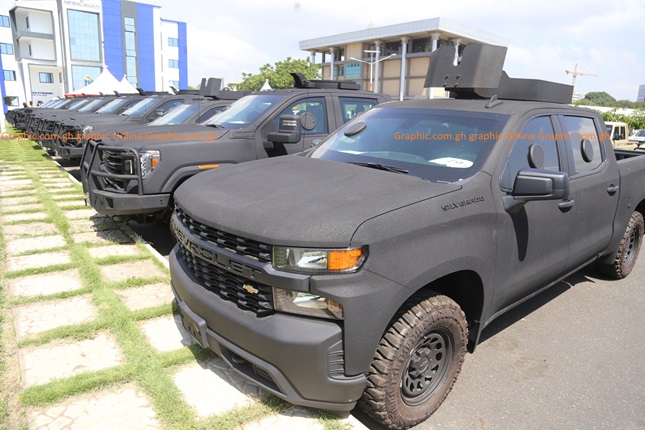
105 vehicles commissioned to fight terrorism in Ghana
President Nana Addo Dankwa Akufo-Addo has taken delivery of and commissioned 105 militarised vehicles for the security agencies to enhance the country's efforts to secure its northern borders against terrorists.
The vehicles and equipment for intelligence and surveillance, military engineering, explosive ordnance disposal, as well as electronic warfare systems, are valued at €20 million. They were donated by the European Union (EU).
Incursions
Commissioning the vehicles and equipment in Accra last Saturday, President Akufo-Addo stated that latest attempts by terrorists and extremist groups to expand their scope of influence from the Sahel to coastal West Africa were obvious and posed a substantial security risk to the people and stability of the country.
“Recent occurrences of terrorist activities in neighbouring Burkina Faso, Togo and Benin underscore the pressing need for Ghana to enhance her counterterrorism measures,” he stated.
The President added that it was imperative to understand that no single country could confront the terrorist threat on its own.
![]()
That required collaborative efforts among nations facing the challenge and critical support from partners such as the EU who shared the security concerns, the President explained.
President Akufo-Addo said within the context of the collective efforts and the pooling of resources, Ghana appreciated the significance of the 105 militarised vehicles donated by the EU.
He indicated that the vehicles would play a pivotal role in Ghana’s efforts to fortify its northern frontiers against terrorists.
President Akufo-Addo assured the EU of Ghana’s commitment to utilise the resources for the agreed purpose which included securing its northern frontiers against terrorist’s incursions.
“Ghana stands ready to continue to collaborate with the European Union to safeguard our mutual security interests, particularly in the West African region,” he added.
![]()
President Akufo-Addo commended the thorough work done by the ministers of National Security, Defence and Foreign Affairs, along with their hardworking staff.
He recalled his recent discussions with the President of the European Council, Charles Michel, about the need for the EU to support Ghana’s fight against terrorism through enhanced cooperation.
Role
The Minister of National Security, Albert Kan-Dapaah, recounted the several engagements the Ghanaian authorities had with their EU counterparts and the opportunity to meet the Vice-President of the EU Commission, Josep Borrell Fontelles.
He acknowledged Mr Fontelles’s deep understanding of terrorist challenges in Africa and the dangers that they posed and expressed confidence in the leadership role Ghana was playing in fighting against terrorism.
“When we concluded the meeting with him, we had no doubt at all about his personal commitment and that of the EU to come to our aid”.
“His presence here underscores the significance of this occasion and the importance of our partnership in the realm of security and counterterrorism and we believe today’s event symbolises a significant step forward in strengthening cooperation between Ghana and the EU,” Mr Kan-Dapaah said.
![]()
Ghana-EU partnership
Taking his turn to address the event which attracted security service chiefs, ministers, deputy ministers and a EU delegation, Mr Fontelles also acknowledged that the partnership between the EU and Ghana had deep and strong roots based on shared values and common interests.
He said it had evolved from a strictly developmental partnership to a more political one that was fit to face the current global challenges such as climate change and the fight against terrorism.
Mr Fontelles said as the seventh contributor to UN peacekeeping operations and as a non-permanent member of the UN Security Council, Ghana had a pivotal role in ensuring regional stability and expressed confidence that the support would not only benefit Ghana, but the entire sub-region.

Job creation for youth
He said the equipment was part of the ongoing projects to reinforce border management and prevent local tensions.
However, Mr Fontelles maintained that countering terrorism required more than armoured vehicles and drones.
He said a successful prevention required improved service provision and job creation, especially for the youth and women.
“We are not here to tell you what to do or how to do it.
You know best how to address the challenges you face.
Everyone chooses its own trajectory and its own priorities.
However, we have a common responsibility to maintain a rules-based multilateral order,” Mr Fontelles stated.
